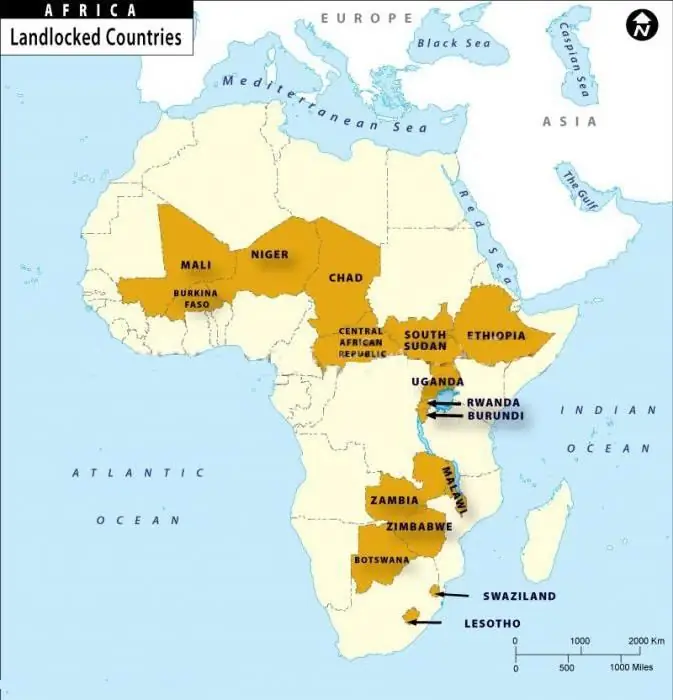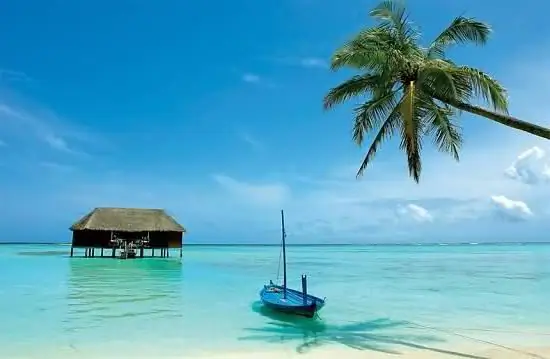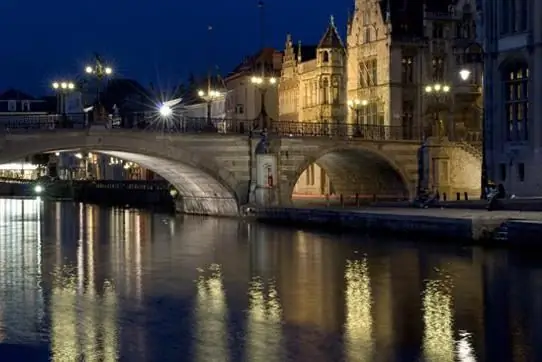- Author Harold Hamphrey hamphrey@travelwaiting.com.
- Public 2023-12-17 10:06.
- Last modified 2025-01-24 11:10.
A landlocked country is characterized by its position in the world, in which the borders do not touch large expanses of water. This is not about lakes or rivers, but about the seas and oceans, which give access to the world basin, transport sea routes and other privileges.

All such territories have their current appearance depending on how the geographical features were combined, the features of the development of fishing, science and other branches of human activity, as well as historical events of different eras. As a result, there are now 44 states isolated from the sea and / or ocean, located in different parts of the world. Let's start with the hot African mainland.
Africa is the leader in landlocked countries
Most of all countries that do not have any contact between their borders and water spaces are in Africa.

From 62 African17 states (one of them - Azavad - is not recognized by the state) have no contact with the sea. These are quite large countries - Niger, Mali, Chad, the Central African Republic, South Sudan, and relatively small ones - Rwanda, Uganda, Burundi, etc. It is here that the largest landlocked country (in terms of population) is located, as well as two next on the list. Apparently, this land loves to surprise with the "most-most".
Due to the fact that Africa is the second largest continent, it is not surprising that some (and more than one) landlocked country is lost on this continent.
Europe occupies an honorable second place in the number of countries without a sea at hand
Landlocked country also exists in Europe. Rather, not one country, but fourteen states and an additional two not recognized as such (Kosovo, Transnistria), are surrounded only by land.

Compared to similar countries in Africa, European brothers "for misfortune" are much smaller in their territory and can lead the opposite rating - the smallest states.
Asia

The collapse of the USSR contributed to the emergence of vast populated areas far from the surf. Landlocked countries in Asia, with twelve recognized and two non-recognized states, also complete the list. Among them: Kazakhstan, Azerbaijan, Afghanistan, Tajikistan, Uzbekistan, Bhutan, etc.
South America and two "cherries"on the cake"
Finally, answering the question of which countries are landlocked, think of Bolivia and Paraguay, which are in South America in the "imprisonment" of neighboring countries that limit their access to the ocean coast.
The rest of the continents are out of the question, since Australia with its mainland state, North America are continents where all countries have access to the sea. In Antarctica, all penguins can also freely, bypassing any posts, come fishing or sunbathing.
Prominent items
Largest landlocked country:
- by the size of the territory - Kazakhstan (2.7 million sq. km); followed by Mongolia (1.5 million sq. km), Chad (1.28 million sq. km), Niger (1.27 million sq. km);
- by population - Ethiopia - 103 million people (data for 2015); Uganda is next with a 2.5 times lead with over 41 million people.
What's wrong with a country not having its own sea?
Which countries do not have access to the sea, we have already sorted out. But what does this mean for them? All entertainment, crafts and work related to the sea horizons are available only in other countries with which there are relevant agreements at the state level. Of course, you can come to any other country to relax on a steamboat, sunbathe on the sand, but fishing will not be available everywhere.
Interference with trade. What is it? In addition to transport by land across the border with all possible problems along the way, the problem of congestion of ports is added.
Landlocked country spends more time waiting for supplies and more money for transportation itself. In addition, you have to fill out a pile of all sorts of papers, wait much longer for shipment than to countries with access to the sea, and you also have to endure extortion of bribes along the way of land routes. Do you want to drive fast, without delay? Here is the size of our "dachshund".
Lack of access to the sea is rightfully considered one of the most important problems leading to the economic backwardness of some countries.






